Riley Adams's Blog, page 151
July 27, 2013
Twitterific
by Elizabeth S. Craig,
@elizabethscraig
 Twitterific links are fed into the Writer’s Knowledge Base search engine (developed by writer and software engineer Mike Fleming)
Twitterific links are fed into the Writer’s Knowledge Base search engine (developed by writer and software engineer Mike Fleming)which has over 20,000 free articles on writing related topics. It's the search
engine for writers.
Sign up for our free newsletter for monthly writing tips and interviews with top
contributors to the WKB or like us on Facebook.
Mike Fleming and writing coach James Scott Bell are
offering an online, interactive, writing program to help make your next novel
great. It's called "Knockout Novel" and you can learn more about it
at Knockout Novel.com.
A free directory of cover
designers, formatters, freelance editors, and more: http://bit.ly/nolbXq
Is Blogging Worth the Time
and Effort? http://bit.ly/1aWIkuH @fcmalby
6 Tips for Finding the
Courage to Write: http://bit.ly/15QUNu0
@QuipsAndTips
Placing Setting Details for
Best Effect-- The Danger of Frontloading Your Story with Description: http://bit.ly/15QV2We
The PERFECT Hook: How to
draw your reader and make him swallow the bait: http://bit.ly/1aWIO3L
What Makes Iconic or
Popular Characters Unforgettable? http://bit.ly/15QVkwe
@melissadonovan
10 Authors Whose Novels
Took Over 5 Years to Write and Publish: http://bit.ly/1aWIWAy
@LauraMarcella
Don't write everyday: http://bit.ly/15QVALx @ElanaJ
The importance of saying
no: http://bit.ly/1aWK0nO
"Writers are atlas
makers": http://bit.ly/15QX0G0
Podcast on subtext: http://bit.ly/1aWK7Qp @cockeyedcaravan
Pacing tips: http://bit.ly/15QXewL @lisagailgreen
High-stakes plotting: http://bit.ly/1aWKjPF @ellecosimano
Why Does "I" Take
Plural Verbs? http://bit.ly/15QXoEs
@grammargirl
How To Come Back Up From
The Writing Downs: http://bit.ly/1aWKryw
@chgriffinauthor
How to make a scene in your
book or screenplay come alive (Prof. Chekhov): http://bit.ly/15QXKe8
A Must Have App For
Writers: Index Card: http://bit.ly/1aWKD0M
@woodwardkaren
Rules for writing: block
that metaphor: http://bit.ly/15QYjES
@guardianbooks
Tips for school visits: http://bit.ly/1aWLcYj
Shift Syntax to Strengthen
Sentences: http://bit.ly/15QYEr2
@writing_tips
(Re)tell Me a Story: http://bit.ly/1aWM1jY @MissDahlELama
So You Want to Write a
Sequel to Your Novel: http://bit.ly/15QZMLu
@amazingstories0
5 dialogue tips: http://bit.ly/1aWMbrC @juliegray
How to Hook Your Reader and
Deliver: http://bit.ly/15QZXGF
@amazingstories0
What are your novel's or
screenplay's 3 magic words? http://bit.ly/1aWMjax
How To Write A Query
Letter: http://bit.ly/15R0aJL
@chgriffinauthor
What's the Visual? Adding
Power To Your Writing: http://bit.ly/1aWMtPl
@MargieLawson
Editing 'As' and 'ing'
Phrases: http://bit.ly/15R0wAe
@gemma_cooper
Letting Your Characters
Lead: http://bit.ly/1aWMGC0
A few good tricks: http://www.stinalindenblatt.com/2013/05/a-few-good-tricks.html
@StinaLL
What Parenting Books Can
Teach Us About Critiquing: http://bit.ly/15R11tT
Resonance: The Core of the
Verse Novel: http://bit.ly/1aWMYZD
4 Tips for Beta Reading in
Other Genres: http://bit.ly/15R1fBv
@jamigold
There are two sides to
every story: http://bit.ly/1aWNs1K
@AJHumpage
If This Is What I Want As A
Reader. . .http://bit.ly/15R1Q65
The Reality of Freelance
Writing: http://bit.ly/1aWNzum
@writing_tips
What Writers Can Learn From
Dan Brown's Inferno: http://bit.ly/15R1YCA
@thecreativepenn
The 7 Basic Plots: Rebirth:
http://bit.ly/1aWNCq4 @write_practice
Things that change in First
Pass Pages: http://bit.ly/15R2aSj
@jodimeadows
Saying no to an editor: http://bit.ly/16g73X5 @fictionnotes
Plot points for fantasies: http://bit.ly/16g6H2Q @ThereDraftAgain
@EMCastellan
Bring characters to life
through their families: http://bit.ly/158ugvv
@MorganMandel
An author's guide to using
Goodreads: http://bit.ly/16IilUi
@SarahPinneo
How to Serve and Swallow
Criticism: http://bit.ly/16Iiozw
@KristanHoffman
A Rare Interview with
Storyteller Stephen King: http://bit.ly/158vtTr
What is the bigger factor
for author success? Marketing or luck? 1 writer's experience: http://bit.ly/16Ij0VR
How to Decide on the Best
Possible Movie Ideas to Develop Into Screenplays: http://bit.ly/158w6wd @scriptmag
Why 'the worst idea ever'
can be useful: http://bit.ly/16IjmvM
@AwfullyBigBlog
What to Include in Your
Ebook Besides The Story: http://bit.ly/158wsTy
@ddscottromcom
7 things I writer has
learned so far: http://bit.ly/16IjLhx
@Pamela_Sherwood
A critique of several
loglines: http://bit.ly/158x7EK
@thestorydepartment
First page critique: http://bit.ly/16Ik24i @JordanDane
Don't overdescribe: http://bit.ly/1cEk2DP @authorterryo
Crime
fiction--people-watching as a tool for fictional sleuths: http://bit.ly/11Sp12d @mkinberg
How to Style Alphabetical
Letters: http://bit.ly/15dyMss
@writing_tips
The definition of
"story physics": http://bit.ly/14o8P8A
@storyfix
Tips for writing in public:
http://bit.ly/15dz5nf @YAHighway
Women's Fiction—A
Publishing Perspective: http://bit.ly/14o90AK
@BenisonAnne
Free eBook Formatting &
Marketing Guides for Writers: http://bit.ly/15dzk1A
@jasonboog
7 stages of blogging: http://bit.ly/14o983r @grubwriters
Working With Your Inner
Reader: http://bit.ly/15dzrKx @tordotcom
How Many Self-Published
Authors Are Making a Living? http://bit.ly/14o9lU5
@PassiveVoiceBlg
How to Start Your Stories: http://bit.ly/15dGhjk @shalvatzis
The Unexpected Exotic:
Settings in Science Fiction and Fantasy: http://bit.ly/14oeUlm
@tordotcom
Beginner's Mind: http://bit.ly/14of8sQ
Indie earnings survey and
results: http://bit.ly/15dGEu3
@Brenda_Hiatt
Earn Readers With
Well-Crafted Sentences: http://bit.ly/15dGJ14
10 Genres that Superheroes
Have Swallowed Up: http://bit.ly/15dGOSf
@io9
Every Writer Needs a Bio: http://bit.ly/14ofDTR @EdieMelson
Weapons while traveling
(info from a weapons expert): http://bit.ly/14ofS1f
Plot points for fantasies: http://bit.ly/16g6H2Q @ThereDraftAgain
@EMCastellan
6 tips for your own
stay-at-home writing retreat: http://bit.ly/1469R7r
@beth_barany
How Book Advances Work: http://bit.ly/180pqTU @michellerichmond
Conflict – No Pain, No
Gain: http://bit.ly/19Y6ery @kathytemean
What it Feels Like to Get
Critiqued: http://bit.ly/12dOH4U
@matty_gibbon
Creativity Takes Time And
Patience: http://bit.ly/19Y7xXq
@criticalmargins
Plotting the Middle with
the Hero's Journey: http://bit.ly/12dP2Vl
@fictionnotes
The Risk-Taking Writer: http://bit.ly/19Y7LOg @terrywhalin
How Do You Build a Fan
Base, Anyway? http://bit.ly/12dP93g
@goblinwriter
How to Host a Buzz-Worthy
Book Launch Party: http://bit.ly/12dPpPA
@bizauthor
4 Kindle formatting
problems you can't fix…so you might as well stop trying: http://bit.ly/19Y8YFq @BooksByEd
21 Things You Need to Know
About Self-Publishing 2.0: http://bit.ly/12dPKSw
@copyblogger
Does Great Literature Make
Us Better? http://nyti.ms/19Yao2R @nytimes
What's the Difference
Between Problems, Flaws, and Goals? http://bit.ly/12dQIy4
@cockeyedcaravan
Piercing the Hype: The
Hybrid Author is the New Pottermore: http://bit.ly/19YcyQ3
Researching settings (that
you don't live in or near): http://bit.ly/12dQPtv
@lifehackorg @halophoenix
Working with the Obstacles
in Your Path: http://bit.ly/19YcWhr
@leobabauta
Is Interior Book Design a
Commodity? http://bit.ly/12nJNn5 @JFBookman
Process-Focused Goals: http://bit.ly/17VrehW
Is publishing about to come
face to face with the corridor of mirrors that is Alt Lit? : http://bit.ly/12nJRmM @thefuturebook
Speculative Fiction and
Bugs: http://bit.ly/17VrkWZ @sfsignal
How Long Should a Scene Be?
http://bit.ly/17VrqxD @joebunting
6 Ways To Make Your
Submission Process Less Time-Consuming: http://bit.ly/12nK0qm
@writersrelief
An analysis of successful
ebook authors' approaches: http://bit.ly/17VrI7S
@tferriss
Why a free chapter is a
lousy thing to give away if you want to sell a book: http://bit.ly/17VrNZ4 @andytraub
Your book is a start-up: http://bit.ly/12nKoF4 @tferriss
Submission: 6 Rules of
Thumb From an Editor-Turned-Writer: http://bit.ly/17Vs4LM
@JaneFriedman @jniesslein
Make the Decision To Do the
Hard Work Before You Start to Write a Book: http://bit.ly/17VsSQF
@SheWrites
Writing Shop Talk: How To
Use Description: http://bit.ly/12nLocm
Confidence: the writer's
crucial asset: http://bit.ly/12nLwIX
Tips for editing blog
posts: http://bit.ly/17Vt8PO
Game writing--In Defense of
Silent Protagonists: http://bit.ly/12nLQr4
@TheEscapistMag
Should You Move Blog
Subscribers To MailChimp? http://bit.ly/17Vtu93
@mollygreene
Why literature should be
more like art: http://bit.ly/12nMepE
@agnieszkasshoes
The 101 Best Written TV
Series: http://bit.ly/12nMsgr
Working with the Obstacles
in Your Path: http://bit.ly/12nMxk9
@leobabauta
Setpiece scenes: the
unlimited production budget: http://bit.ly/12nMEfA
Mantras for writers: http://bit.ly/18uQI2I
Does your first line hook
readers? http://bit.ly/18y51Hh
@lynnettelabelle
Writing is rewriting: http://bit.ly/18uQOHr @shalvatzis
Superfluous Words: http://bit.ly/18uQSXG @artzicarol
Back up your manuscripts
and business files: http://bit.ly/18uR1dT
@ddscottromcom
Using nature as a
weapon in crime fiction: http://bit.ly/18uWykp
@mkinberg
A wrap-up of a couple of workshops, with
craft tips for writers (subtext, strong openings, etc.): http://bit.ly/18yqMqp @authorterryo
A closer look at issues facing
agent-assisted publishing: http://bit.ly/18yvvIu
@Porter_Anderson
Faulkner Heirs Lose Lawsuit Against Sony
Pictures: http://bit.ly/161IvCJ
@Pubperspectives
Are authors on a tightrope with Author
Solutions? http://bit.ly/162Q2kM
@Porter_Anderson @DavidGaughran @molbarton
Without gatekeepers to reject them, new
sub-genres spawn: http://bit.ly/1bQPuTk
@barbaraoneal @Porter_Anderson
Why Stephen King Spends 'Months and Even
Years' Writing Opening Sentences: http://bit.ly/13dpg4R
@joefassler @TheAtlantic
Book Country: Opening New Territory: http://bit.ly/13dzdiX @Porter_Anderson
@molbarton @brandilarsen
Writing tips based on your Zodiac
sign--WriterScopes: http://bit.ly/13kdUSD
@janetboyer
"Hoping for Amazon to collapse or
fail is (mutually) self-destructive." http://bit.ly/13dOfFc
@fakebaldur @Porter_Anderson
Published on July 27, 2013 21:02
Doing Something Different
By Elizabeth S. Craig, @elizabethscraig

One of the reasons that I went on break
for a couple of weeks was that I was on vacation in Kenya. :)
It was a wonderful vacation. We have family that live and work in Africa
and had encouraged us to experience Kenya.
It was great to have guides who were so familiar with the area (and who
spoke several languages). We saw the
bustling Nairobi, the lovely Rift Valley, went on safari, and experienced the
Kenyan coast. It was an amazing trip. (And I'm clearly trying to still catch up, since this post is a day late!)
And y’all know that I rarely even leave
my house unless I’m running errands or shuttling children around—so this trip
was a big deal to me.
As I’ve mentioned here before, I’m a
planner. I’m very cautious and need an
abundance of information on something before I experience it—that’s even true
of small events I attend near my home or camps for my children. I packed weeks before we left…and repacked.
And shifted things from bag to bag. Yes,
I’m fairly neurotic.
When I talked with friends and family
about leaving, I’d bring up all the aspects of the trip that made me
anxious—the vaccinations we needed, organizing the flights, staying healthy,
our accommodations, etc.
People who knew me best had a particular
reaction to the news. “Oh, Elizabeth,”
said more than one person, “that will be so good for you.”
They were right and I knew it when they
said it. We can be too fond of the
familiar, too eager to keep away from crowds, too happy to stay at home. As writers, it’s also good to grow a
little. To stray from our comfort
zone. To fire up our imaginations with
different experiences, different sights, different tastes, different people.
I don’t think we have to go to Africa to
do it, either. We can push ourselves
into new and different situations nearer to home, too.
Have you broken out of your routine or
your comfort zone lately? What was it
like? How did it go?
Published on July 27, 2013 05:00
July 23, 2013
Word Count
By Elizabeth S. Craig, @elizabethscraig

I do like to keep track of both where I
am in a story and how much I’m able to accomplish each day. That’s mainly because I deal with
deadlines. I’ve had to feverishly finish
a story before in the 11th hour and
boy, that wasn’t fun (that was also an un-outlined book, so I wasn’t even sure
exactly where I was going with the story.
Thankfully, it somehow ended up fine.)
I like to pay attention to my progress
also because with my genre, there’s a pattern to the events there and I need to
stay on-target or else my pace may be off.
I don’t need a bloated beginning—that’s no fun to read. But I don’t need a bloated ending, either,
with a sleuth going on and on about how
clever she was in figuring out the killer.
I like a second body near the middle of the book to keep readers
guessing, so I also need to know when I’m about halfway done with the
manuscript.
But—I know some writers who are messed up
by worrying about their progress while working on the first draft. Tracking their word counts makes them feel
frantic and as if they need to catch up.
So there’s really no need to keep
up with your progress as you’re working on the story if it makes things worse.
For those who like to track their
progress on the story, there are different ways of doing so. I think I’ve done all of them. One is word
count—the actual number of words.
I do track this from time to time, to make sure I’m on target for the
75,000 words I’m supposed to shoot for.
For me, though, I like tracking my page progress on a day to day basis. When I’ve got a deadline, I’m writing 3.5
pages a day to stay on goal. With my
self-published books, I might give myself a little more leeway…but still around
3 double-spaced 12 pt. font Word pages each day. Usually I don’t write them all
at once—writing half of them in the morning when I wake up and half later in
the morning or after lunch.
I set myself a daily goal, but for others
a weekly goal might work better. If you
have a chaotic schedule, setting a weekly goal can give you a chance to make
your goal by either spreading your goal out each day or having a marathon
writing session all at once to catch up.
When should
we worry about word counts?
Definitely before we submit a manuscript
to a traditional publisher because there are genre guidelines. Any publisher is
going to be worried about a 170,000 word book from an unpublished author with
no track record. My contracts hold me to
75,000 words for my cozy mysteries. I’m
usually either right under that or right over it.
Too short is also a problem, although
sometimes it’s not as much of a problem.
I tend to write really short—Midnight Ink took my 206 page book without
making a mention of plumping it up. I’ve
also written short for Penguin and haven’t heard any feedback on it (although
they did reduce the price of that book by a dollar compared to the others in
the series.)
More articles on word count:
India Drummond’s “How I Easily
Doubled My Daily Word Count”
Chuck Wendig’s “How to Maximize Your Word Count
and Write More Every Day” (as always, I have to give a warning about the strong language Chuck
uses in his posts…but he does provide excellent advice.)
Do you track word count or pages written?
Why or why not?
Image: Flickr: Tom Raftery
Published on July 23, 2013 21:01
July 21, 2013
Chapter Length
by Elizabeth S. Craig, @elizabethscraig
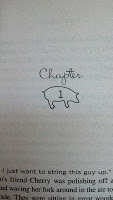
Hope everyone has had a good last couple
of weeks…I did. I even managed to have
an adventure…more on that on Friday.
From time to time I get emails or
comments asking about manuscript basics.
The emails are frequently apologetic in nature as if the writer were
asking something that everyone knew but her.
That’s just not the case because I see shifts in areas even relating to
manuscript formatting—it’s always worth asking.
This particular question was from another
mystery writer and the question was on chapter length.
I used to write longer chapters than I do
now. There are several reasons why I
think I did…although I didn’t put much thought into it at the time. One reason is that I built in a good number
of section breaks into each chapter. My
chapters frequently encompassed several scenes (so, there’d be a big change of
some kind at several points in the chapter: a change of setting, a change of
characters my sleuth was talking to, etc.)
Another reason is that I put my chapter breaks in as I wrote—and I don’t
think I paid very much attention when the last chapter had occurred or how many
pages I was into the new chapter. There
would simply seem to be a great spot for a chapter break and I’d stick it in
and go merrily on my way. My editors didn’t mind this…I was never asked to
change the location of a break or to make my chapters a different length.
What made me switch to short chapters
were the readers. Obviously, we’re
talking about genre fiction/commercial fiction here—if you’re writing literary
fiction, this probably won’t apply. But the readers actually complained about my
chapter length—both directly to me in email and in customer reviews on online
retailers like Amazon.
That made me immediately change
course. Readers said that their busy
lives meant that they needed more frequent chapter breaks so that they could
find their place easier (these are obviously readers who are reading the mass
market paperbacks and not the ebooks.)
They also felt that longer chapters set a slower pace…they felt they
weren’t making progress.
At this point, I’ve usually got one scene
per chapter. My chapters are ordinarily
10 pages (double-spaced Word docs…each page at 250 words…although sometimes my
pages have fewer than 250 words since I use a lot of dialogue.) I haven’t heard a bit of criticism on my
chapter length since then. And no
comment from Penguin on my change….they don’t seem to mind one way or the
other.
My other change in the way I approached
chapters was that I inserted chapter breaks at the end of the first draft. This helps me to keep the breaks fairly
regular and helps me adhere to my 10 page-break goal. Sometimes, obviously, I’m not exactly 10
pages between breaks. There will be some
areas in a book where a chapter break is perfect…cliffhanger moments. So, if I’ve got a body discovered, I’m not
sticking that right in the middle of chapter ten. I’ll either make chapter ten super-short or change the length of bordering chapters.
Again, as I like to reiterate on these
kinds of posts—there is no wrong or right method. I’ve never had an editor talk with me about
chapter length.
How long are your chapters, as a
writer? As a reader, do you have a
preference?
Published on July 21, 2013 21:01
July 20, 2013
Twitterific
By Elizabeth S. Craig, @elizabethscraig

by Elizabeth S. Craig, @elizabethscraig
Twitterific links are fed into the Writer’s Knowledge Base search engine (developed by writer and software engineer Mike Fleming)
which has over 20,000 free articles on writing related topics. It's the search
engine for writers.
Sign up for
our free newsletter for monthly writing tips and interviews with top
contributors to the WKB or like us on Facebook.
Mike Fleming
and writing coach James Scott Bell are offering an online, interactive, writing
program to help make your next novel great. It's called "Knockout
Novel" and you can learn more about it at Knockout Novel.com.
I'm
back from my blog break! :) Good to be
back.
Gardening can make you a
better writer: http://bit.ly/132mXrb
@pronounced_ing
Theories of Productivity
for Writers: http://bit.ly/10LArGy
@charmaineclancy
6 Reasons Google+ Beats
Facebook for Author Platform Building: http://bit.ly/11XIQRZ
@janefriedman
Start Collecting People: http://bit.ly/10LB1Ed @wendylawton
First or Third Person:
Which Point of View Is Best? http://bit.ly/11XJ8Z9
@jodyhedlund
Do Fans Really Own Fan
Fiction? http://bit.ly/10LBaYj @hoodedu
@theatlantic
Building tension: http://bit.ly/11XJjne @Janet_Reid
Are the genre wars won? http://bit.ly/17zMvxA @tordotcom
12 Get-Serious Questions
for Writers: http://bit.ly/15BIgdP @12Most
@kdbelmonte
Books for the Creative
Mind: http://bit.ly/17zMN7I @PsychCentral
Literary Talent vs. Story
Talent: http://bit.ly/15BID8j
@ingridsundberg
A Writer's Toolbox--5 Tips
To Landing That Interview: http://bit.ly/17zNbmv
@LisaHallWilson @angelaackerman
How to Format an eBook for
Kindle: http://bit.ly/15BJh5H
@davidgmasters @FreelanceSw
5 things every work-at-home
parent needs: http://bit.ly/17zNuxU
@TheHappiestHome
5 critical steps to niche
publishing success: http://bit.ly/15BJwOc
@bookbaby
Marcus Aurelius's One
Question to Beat Procrastination, Whining, and Struggle: http://bit.ly/17zNPR8 @theatlantic
@JessicaFKane
The myth of plateauing
e-book sales: http://bit.ly/15BJZ2U
@thefuturebook @jwikert
Why You Need An Elevator
Pitch Even If You Always Take The Stairs: http://bit.ly/17zO6DG
@jennifermalone
Why What Others Are Doing
Isn't Working for You: http://bit.ly/14prdMT
@jeffgoins @KimanziC
Freelancing--Why Writing
For Free is Better Than Writing for $20: http://bit.ly/10RBdSa
@ticewrites
3 Quick Ways to Perk Up
Your Email Marketing Efforts: http://bit.ly/14prwqR
@copyblogger
Interactive Fiction
Authoring Tools: http://bit.ly/14prJKJ
@matty_gibbon
How to Write a Book
Proposal for Your Blogged Book: http://bit.ly/10RBy7C
@ninaamir
Is your blog representative
of who you are personally and as a writer? http://bit.ly/16zbGfa
@marygkeeley
Inserting Images in
Scrivener: http://bit.ly/14XfFTE
@Gwen_Hernandez
When *not* to market your
book: http://bit.ly/14XfNlV @BTMargins
@annbauerwriter
Tips for Making Video Blog
Posts: http://bit.ly/16zbSLn @meghancward
On writing about real
people: http://bit.ly/16zcd0G @tanisrideout
Find the meanings of words
you're not sure of before you use them in your writing: http://bit.ly/16zclgE @ZiggyKinsella
5 writing habits that might
be tripping you up: http://bit.ly/14Xguvt
20 Reasons to Write Your
Nonfiction Book Now: http://bit.ly/14XgRGp
@NinaAmir
Fairy Tales--The Handless
Maiden and Forest Sanctuary: http://bit.ly/16zcSPM
@terriwindling
How to Identify People by
Name in Your Story: http://bit.ly/14Xh1xq
@writing_tips
Passive marketing: http://bit.ly/16zcZKZ
Avoid Repeaters Like These:
http://bit.ly/1210rrh @lynnettelabelle
Are Reviews TOO Subjective
to be Worthwhile? http://bit.ly/17CUnhH
@jodyhedlund
The changing playing field
of publishing: http://bit.ly/1210vaw
@kristinerusch
7 Ways Friends Can Support
Your Book (and How To Ask For Their Help): http://bit.ly/17CUDxo
@bookmarketer
Writing Books for Children
- Traditional Submissions: http://bit.ly/1210RxW
@karencv
Writing Your Memoir, If It
Feels Right: http://bit.ly/17CUQ3x
@kathypooler @SouthrnWritrMag
25 tips for handling
multiple writing projects: http://bit.ly/17CUSsg
@ajackwriting
A Two-Year MFA in Writing
Reading List in One Post: http://bit.ly/12113NN
@PatrickRwrites
Elements of successful
fiction (and making time to write): http://bit.ly/17CV7U5
@JimHarris28
Put a more modern spin on a
Cinderella story: http://bit.ly/1211kQM
@mooderino
Tips for blog post
planning: http://bit.ly/17CVf66
How To Be More Objective
About Your Own Writing: http://bit.ly/1211xDB
@WritersRelief
The Pace of Productivity
and How to Master Your Creative Routine: http://bit.ly/17CVrCm
@brainpicker
3 Ways Serials Can Improve
Your Writing: http://bit.ly/17CVz4H
@susankayequinn
How to Use Hyphens: http://bit.ly/1211R5b @grammargirl
How to manage large casts
of characters: http://bit.ly/17CWguX
@Rachel_Aaron
A Series of Shots for Quick
Action: http://bit.ly/17CWqCG
@livewritethrive
Why Your Protagonist Might
Not Always Be Your Hero: http://bit.ly/1212mfu
@kmweiland
The Modern Writing-School
Paradox: More Students, Fewer Jobs, More Glory: http://bit.ly/17CWNNB
@theatlantic @Jon_Reiner
The 4 Roles of Creativity:
Explorer, Artist, Judge, Warrior: http://bit.ly/1212LhY
@99u
Yes, We Really Do Judge
Books by Their Covers: http://bit.ly/17CXoPg
@IndieReader
The care and feeding of
your imagination: http://bit.ly/1212YSx
@wendypmiller
How To Set Goals Without
Screwing It Up: http://bit.ly/17CXMx6
What to Write in the
"Bio" Section Of Your Query Letter: http://bit.ly/1213aRC
@ChuckSambuchino
LinkedIn for Writers: http://bit.ly/17CY5YH @JanalynVoigt
Overwriting: http://bit.ly/10WreLm @AimeeLSalter
On-site book research: http://bit.ly/15GYfr8 @nancyjcohen
A Short Introduction to
Speed Writing: http://bit.ly/10WrxG0
@FreelanceSw
Are You Ready to Contact an
Agent? Take This Short Quiz and Find Out: http://bit.ly/15GYIK1
When To Let The Reader Into
The Character's Head: http://bit.ly/15H02wm
@mooderino
Depression and Writing: http://bit.ly/10WD8VE @gingersjohnson
Who, Whom, Whoever,
Whomever - How to Decide Which is Right: http://bit.ly/10WDnA3
@nickdaws
Can Screenwriting Contests
Advance Your Career? http://bit.ly/17FXpBU
@MarioOMoreno37
9 Types of Functional
Variation in Grammar: http://bit.ly/14xX7qD
@writing_tips
5 Easy Ways to Publicize
and Promote Your Book: http://bit.ly/17FXAgK
@mpnye
Is there still a role for
the commercial publisher? http://bit.ly/14xXph2
@ScottTheWriter
New trends in ebook
pricing: http://bit.ly/17FXMwo
@laurahazardowen
Anne Rice's Advice On
Writing: http://bit.ly/14xXDEX
@woodwardkaren
5 Ways to Develop a Book
Idea: http://bit.ly/17FY2vg @BrianKlems
Surviving in publishing--an
epic publishing saga: http://bit.ly/14xYlSC
@dancinghorse
Remember to follow these
internet rules via lit. agent @rachellkent http://bit.ly/17FZqhr
Tips for better blog posts:
http://bit.ly/14xZBFq
9 opportunities to promote
your book: http://bit.ly/17FZP3o
@PublicityHound
9 Rules for a Simpler Day: http://bit.ly/14xZSIp @LeoBabauta
What Can Writers Learn From
Actor Interviews? http://bit.ly/17FZYE6
@jeannevb
How to speak publisher: F
is for frontispiece: http://bit.ly/14y0IoD
@annerooney
5 Sound Bite Mistakes That
Will Lose You Freelance Clients: http://bit.ly/17G0wtw
@soundbitesiren
9 Tips on Becoming a More
Creative and Productive Writer: http://bit.ly/14y15zv
@copyblogger
4 tips for writing
antiheroes: http://bit.ly/17G0ZvV
@standoutbooks
The Difference Between
Idea, Premise, and Plot: http://bit.ly/14y1tOi
@Janice_Hardy
14 Blog or Website
Essentials for Writers: http://bit.ly/17G15DT
@jillkemerer
5 Ways to Find the Right
Freelance Book Editor: http://bit.ly/14y1AJN
@stacyennis
Proactive vs. reactive
characters: http://bit.ly/11SjzsQ
Your Website is Outdated
Because: http://bit.ly/17HDnqJ @hostbaby
Why Google Plus is
Essential for Authors: http://bit.ly/11SjOnA
@bookmarketer
Traditional Publishing And
Their March to the Future: http://bit.ly/17HDxhH
@deanwesleysmith
Thoughts on Parenting a
Writer: http://bit.ly/15dagnX @mollybackes
Letting go of scarcity
thinking: http://bit.ly/11IIIoB
@rachellegardner
How to use GIMP for design:
http://bit.ly/12HSPjx , http://bit.ly/12HSPjB , http://bit.ly/12HSPjD , http://bit.ly/12HSPjF @clarissadraper
Booksellers finding success
through a leaner ordering method that helps eliminate returns: http://bit.ly/16veQkE @kristinerusch
Things a scene needs: http://bit.ly/19gzI08 @mooderino
How to create a style sheet
for your manuscript: http://bit.ly/17HEd6M
@rachellegardner
Traumatizing Your
Characters: Intrusive Recollection: http://bit.ly/11SksBG
@finesarah
Don't Dumb down Your
Characters to Make Your Plot Work: http://bit.ly/17HEoz6
@americanediting
Buy Some Fresh Eyes: Let
Your Novel Rest: http://bit.ly/11SkARC
@lindasclare
How Would You Make the
Movie of Your Book? http://bit.ly/17HEEy1
@janice_hardy
Songwriting--horror themes
in heavy metal music: http://bit.ly/12I5pzn
@BubblewsBlog
Managing Your Facebook
Privacy: http://bit.ly/11SkWYo @lifehackorg
Nourishing the Self by
Finding the Time to Write: http://bit.ly/11Sl4qT
@SarahHackley @womenwriters
Most Common Mistakes: A
Surefire Sign You're Over-Explaining: http://bit.ly/17HFjQ7
@KMWeiland
Tips for writing faster: http://bit.ly/11SlzRR @michellerafter
7 Things to Know about
Getting Your Author-Published Book into Libraries: http://bit.ly/17HFU4a @SusanWAlbert
9 Master Class Twitter
Tips: http://bit.ly/11SlX2T
@pubperspectives @BrandYou
A Psychological Self-Help
Tool for Fiction Writers: http://bit.ly/17HGhvu
@writerunboxed
Character Building Tips for
Writers: http://bit.ly/17HGuPv @jeanoram
Character Archetypes: The
Creator: http://bit.ly/11Smm5j
@jeanniecampbell
9 Ways to Write Smarter,
Not Harder: http://bit.ly/17HGZJp
@carlywatters
Is the Character Me? Yes!
And, no! http://bit.ly/17HH3sG @jeffcohen
The importance of finishing
our writing: http://bit.ly/11SmIJ1
The Verminous Hazards of
Research: http://bit.ly/17HHnYq
@womenwriters @berylkingston
The Locomotive in Science
Fiction Literature: http://bit.ly/11SyF1x
@clarkesworld
Yoga for Writers: http://bit.ly/11SyKCi
Tips for being a better
blog guest: http://bit.ly/17HUdpx
The Five Times Treatment: http://bit.ly/17HUitp @womenonwriting
Complications Of
Storytelling: http://bit.ly/11Sz9Vg
@mooderino
Increasing your enthusiasm
for writing: http://bit.ly/11SA3RM
@pyrosama
What Should You Expect from
a Freelance Editor? http://bit.ly/11SA7AZ
@ThereseWalsh
Tags & Traits:
Characterization And Building Empathy: http://bit.ly/17HVNaL
@woodwardkaren
10 Stupid Writer Tricks
(That Might Actually Work): {language}: http://bit.ly/11SAg7s
@chuckwendig
Publishers know their
audience--but variety might sell, too: http://bit.ly/11SAoUD
@museinks
25 Things You Should Know
About Young Adult Fiction: http://bit.ly/10q5ULT
@chuckwendig
Tips for Researching When
Writing: http://bit.ly/16FD4Iv
What Makes Writing Fun: http://bit.ly/10q67yT @deanwesleysmith
@woodwardkaren
25 Types of Author Tweets
(with examples): http://bit.ly/16FDizo
@duolit
Why it's Good to Rush to
Get Published: http://bit.ly/16FDui0
@lyndaryoung
4 Lessons for Independent
Authors: http://bit.ly/16FDDlq @chrisrobley
7 Things to Understand
Before Traditionally Publishing Your Book: http://bit.ly/10q6Qjl
@ninaamir
When you're character's
observing: http://bit.ly/10q6Tvw
@JordanMcCollum
12 tips for getting past
writer's block: http://bit.ly/16FEaDW
@12most
Writing a great scene: http://bit.ly/16FEkve
"Deepening in" to
a scene of oppression: http://bit.ly/10q7u0s
@juliettewade
Writing Books for Children
- From Contract to Sales to a Writing Career: http://bit.ly/15QyBjV
@karencv
Scriptwriting (horror): The
New French Extremity: An Endeavour into Excessive Violence: http://bit.ly/1aWvP20 @the_artifice
@__Jameswalker
Would you pay readers back
for reading your book? http://bit.ly/15Qz4CB
@galleycat
Plagiarism: http://bit.ly/1aWw39u @MBTPonderers
Writing Dialogue for
Novels: Tips for Cursing: http://bit.ly/15Qzmt3
@AdriennedeWolfe
With a serial, EVERY scene
is an important scene: http://bit.ly/1aWwikP
@CamilleLaGuire
10 promo tips: http://bit.ly/1aWA4e6 @ethanfreak
Neil Gaiman on "Why
Fiction is Dangerous": http://bit.ly/1cyWfVA
@tordotcom
Hashtag creation tips: http://bit.ly/1aWAfpQ @bookmarketer
The Real Reason Coffee
Shops Boost Productivity: http://bit.ly/1cyWG2k
@davidburkus
Dealing With Perfectionism
As A Writer: http://bit.ly/1aWAn8N
@VeronicaSicoe
What Is Horror? http://bit.ly/1cyWZu5 @annieneugebauer
1 author explains his
picture book process: http://bit.ly/1aWAxwI
@writersdigest
4 Changes to English So
Subtle We Hardly Notice They're Happening: http://bit.ly/1cyXBzD
How to read more blogs in
less time: http://bit.ly/1aWAUHR
@rachellegardner
7 ways to make sure your
ideas don't take off: http://bit.ly/1aWAYY6
@lifehackorg
De-Deifying Agents: http://bit.ly/1cyY98Q @CharleeVale
@writeangleblog
Hooking the Reader: The
Character Investment: http://bit.ly/1aWB7L2
@kayedacus
Is There a Place for Style
in Genre Fiction? http://bit.ly/1cyYqZi
Race, Identity, and
Writing: http://bit.ly/15QRKST
@Kathy_Crowley
How to escape a schedule
and write: http://bit.ly/1aWGLg8
@emilywenstrom
5 apps for writing and
blogging: http://bit.ly/15QS0RK
@michellerafter
Worldbuilding--families: http://bit.ly/1aWGOIZ @juliettewade
Dealing with commas and
adjectives: http://bit.ly/1aWGXvP
@RayRhamey
A Book Club Guide To
Discussing Short Story Collections: http://bit.ly/1aWH7n2
@BTMargins
The Successful Children's
Writer: Many Eggs, Many Baskets: http://bit.ly/15QSEPb
@cbiclubhouse
3 things 1 writer has
learned in the past 5 years: http://bit.ly/1aWHYEj
@dorothydreyer
1 writer's struggle with
deadlines: http://bit.ly/1aWI7HO
@mstiefvater
Uncomfortable Truths: Five
Authors Who Do Not Live Up To Their Mythology: http://bit.ly/15QUtM0
@cathinnorway
6 Tips for Finding the
Courage to Write: http://bit.ly/15QUNu0
@QuipsAndTips
Writing to Trends: http://bit.ly/1aWJciK @SaraBLarson
@cvaldezmiller
3 writers on writing and
creativity: http://bit.ly/15QVZO4
Published on July 20, 2013 21:01
July 7, 2013
Blog Break
 by Elizabeth S. Craig, @elizabethscraig
by Elizabeth S. Craig, @elizabethscraig
Hope everyone is having a good summer so far.
I’m going to take a couple of weeks off, but
will return to the blog on Sunday, July 21 with Twitterific.
Happy writing!
Published on July 07, 2013 21:01
July 6, 2013
Twitterific
By Elizabeth S. Craig, @elizabethscraig

Twitterific links are fed into the Writer’s Knowledge Base search engine
(developed by writer and software engineer Mike Fleming) which has over 20,000
free articles on writing related topics. It's the search engine for writers.
Sign up for our free newsletter for monthly
writing tips and interviews with top contributors to the WKB or like us on Facebook.
Mike Fleming and James Scott Bell are
offering an online, interactive, writing program to help make your next novel
great. It's called "Knockout Novel" and you can learn more about it
at Knockout Novel.com.
I have a new book
out. :) Rubbed Out
debuted on Tuesday.
A free directory of cover designers,
formatters, freelance editors, and more: http://bit.ly/nolbXq
9 facts about life that 1 writer has
learned from writing about death: http://bit.ly/146pdcc
@danasitar
Pitching To Understaffed Media: http://bit.ly/180lNxw
Cause-related marketing: http://bit.ly/19WSqhd
@Kaylee_Kendall
Traumatizing Your Characters: How
Vulnerable is Your Character? http://bit.ly/146pWKk
@finesarah
Answers to 18 Self-Publishing Questions: http://bit.ly/180lVNk @jfbookman
Marketing Toolbox: Ebook Cards: http://bit.ly/146qjET @JLeaLopez
@writeangleblog
Moving Out of Your Writing Comfort Zone: http://bit.ly/146qpwc @do_north
3 Resources for Setting: http://bit.ly/146qIqM @SherlockedSarah
3 Myths That Are Killing Literary
Culture: http://bit.ly/180mBlL
@michellerichmon
How to Become a Your Own Story Idea
Generator: http://bit.ly/180mKWq
@manon_eileen
Is Your Outline Killing Your Novel? http://bit.ly/146rJPQ @michellerichmond
Writing reviews--some guidelines and
suggestions: http://bit.ly/180ncnI
@SmartBitches
25 Things To Know About Sexism &
Misogyny In Writing & Publishing: http://bit.ly/146tfkS
@chuckwendig
Adding gravitas to your writing with
quotes: http://bit.ly/146vdl9
Script To Screen: "The
Searchers" : http://bit.ly/180oSNO
@gointothestory
The Literary Appeal of Gods, Goddesses
and Myths: http://bit.ly/180oVcF @sfsignal
Are Your Multiple POVs Killing Your
Story's Suspense? http://bit.ly/146vwws
@KMWeiland
4 types of book titles that 1 reader is
tired of: http://bit.ly/180p3bX
@BooksAreMyBFs
Selling your publisher on a particular
title: http://bit.ly/146vLrt
@AdriennedeWolfe
Writing for Children: Four Traditional
Publishing Steps: http://bit.ly/180penC
@karencv
How to Nail the Opening of Your Blog
Post: http://bit.ly/146w19J @copyblogger
What's the best price for a
self-published ebook? $3.99, Smashwords research suggests: http://bit.ly/180pkvK @laurahazardowen
Even Alpha Writers Need Beta Readers: http://bit.ly/146wiJI @tiffanyreisz @Janice_hardy
How Book Advances Work: http://bit.ly/180pqTU @michellerichmond
Character arcs at the climax: an example
in high art: http://bit.ly/180pu69
@JordanMcCollum
Thriller, Conspiracy and Action: http://bit.ly/14MSOdm @cockeyedcaravan
Death by Comparison: http://bit.ly/12epcAg @beccapuglisi
The Pace of Productivity and How to
Master Your Creative Routine: http://bit.ly/14MSXNN
@brainpicker
An Inside Look at Today's Book Reviewers:
http://bit.ly/12epfvH @BooksAndPals
An agent lists 10 recent queries and what
made her request the manuscript (or not request it): http://bit.ly/14MTkbk @forewordlit
Looking for ways to feel grateful when it
comes to our writing: http://bit.ly/14MUnrD
@Amy_Lamont
Gift Your Reader, Not Yourself: http://bit.ly/14MVCHo @SouthrnWritrMag
@LindaAcaster
Author Confidence or Self-Doubt? http://bit.ly/12es1RS @loislavrisa
World-Building 102: The Word-Smith's
Craft: http://bit.ly/14MVGqs
Bestselling Fantasy Author Raymond E.
Feist on Thirty Years of Writing: http://bit.ly/12es93A
@refeist @amazonbooks
Wanted: Literary Mentor: http://bit.ly/14MVPtY @marcomcgrath
@parisreview
Why Mid-List Indies & Agents Don't
Add Up: http://bit.ly/12esun5
@JoeNobodyAuthor @IndieReader
School Visits: Seeking Them Out and
Setting Them Up: http://bit.ly/14MW6NM
Finding an agent: http://bit.ly/12esG5D @Fictiffous @beth_barany
When you've written yourself into a
corner, sometimes other writers can help you get out: http://bit.ly/14MWfRk @gaslightvt
Hacking away at your opening: http://bit.ly/12esWBI @MartinaABoone
@clazebnikwrites
What Makes Fiction Good? It's Mostly the
Voice: http://bit.ly/14MWA6y @theatlantic
@tanehisi
How to Write a Novel: 7 Tips: http://bit.ly/12etWWw @jennifermcmahon
@ChuckSambuchino
1 writer likes likeable characters--and
dislikes a new way of dismissing female writers: http://slate.me/1c1ykxP @slate
@jenniferweiner
An advocate for minimalist punctuation: http://bit.ly/123KUv9 @mstibbe
Give your Nemesis a plausible world view:
http://bit.ly/1c1z6ee @gointothestory
How to transform a comment troll into a
human being: http://bit.ly/123LxEJ
@paidcontent
10 ways to accelerate your writing
process: http://bit.ly/1c1B91X @mstibbe
Rejection: A Critical Device: http://bit.ly/123MFsb @litreactor
What Your Reading Rules Reveal About Your
Personality: http://bit.ly/1c1BrpH
@onetruejeantt
8 Symbols That We Turned Into Words: http://bit.ly/123MRHL @mental_floss
Getting Over Writer's Block: Listen To
Your Characters: http://bit.ly/1c1Cg1A
@woodwardkaren
Music inspires a short story writer's
plots, mood, and characters: http://bit.ly/123NvoC
@jonpinnock @byRozMorris
Seven research tips for informed writing:
http://bit.ly/1c1D6eW @Claredodd
Business Basics for Today's Writer—Cover
Letters and Proposals: http://bit.ly/185CPKF
@EdieMelson
9 Practices for Cultivating Creative
Life: http://bit.ly/13ZWgQT
@CreatvEmergence
10 Points About Possessives: http://bit.ly/185D4oM
@writing_tips
Getting organized as a writer: http://bit.ly/13ZWvLu @jennaavery
8 Steps to Create Visually Appealing Blog
Posts: http://bit.ly/185Degb @rbelliston
Branding Yourself as a Scriptwriter: http://bit.ly/13ZWEyE @jacobkrueger
3 Ways Your Book Can Sell Itself: http://bit.ly/185DoE2 @selfpubtoolkit
A quick tip to improve your writing: http://bit.ly/13ZWNCm @changeitupedit
Self-Editing Tips and Tricks: http://bit.ly/185DFqD @KristenJett
3 Tips for Naming Characters: http://bit.ly/13ZXfAw @write_practice
As an Author, Is It Worth Being in the
Amazon Associates Program? http://bit.ly/185E3Wb
@goblinwriter
World Building Tips Learned at the
Louvre: http://bit.ly/13ZXlrE @Janice_Hardy
The importance of word of mouth: http://bit.ly/185Edg7 @Kristinerusch
Attracting Screenwriting Representation
with a Strong Body of Work: http://bit.ly/13ZXw6h
@scriptmag
Using Excel to track writing goals and
make financial goals: http://bit.ly/185EsI0
@woodwardkaren
A 3-week map for boosting your
start-of-day productivity: http://bit.ly/13ZXITg
The climate of criticism: http://bit.ly/185EFuY @jodyhedlund
Is There A New New Wave of Science
Fiction, And Do We Need One Anyway? http://bit.ly/185JFj7
@tordotcom @davidmbarnett
How To Write A Compelling Pitch and
Synopsis: http://bit.ly/1402mRg @fcmalby
How Reading Makes Us More Human: http://bit.ly/185JQLu @theatlantic
@LoveLifeLitGod
Top Five Things Not to Put in your Query:
http://bit.ly/1402wrM
Develop Your Writing Through
Inspirational Self-Critics: http://bit.ly/185K7xK
@lizstrauss
De-Clutter Your Mind to Become a More
Productive Writer: http://bit.ly/1402Jet
@ticewrites
How to Build a Stockpile of Good Writing
Ideas: http://bit.ly/185KhW9 @chrisrobley
What if Your Antagonist Isn't a Person? http://bit.ly/1402Q9T @kmweiland
Setting as a Character: http://bit.ly/185KqZy
Physical Attributes Thesaurus Entry:
Back: http://bit.ly/1402VKJ @BeccaPuglisi
Write a Query Letter that Compels Agents
and Editor to Read More: http://bit.ly/185KBnA
@ninaamir
A brief history of Jennifer Weiner's
literary fights: http://bit.ly/140368Z
@salon @DPD_
Publishing Jargon-Buster: Ten Words
Unpacked: http://bit.ly/185KYPb @tordotcom
@BellaPagan
Save the Cat! Video: José Silerio on Beat
15 – Final Image: http://bit.ly/1403unJ
How long does it take to learn how to
fight? Training up your protagonist: http://bit.ly/185Lcpq
@ajackwriting
Your First Idea is Not (Usually) Your
Best: http://bit.ly/1403EeT
How Character Emotional Development
Merges with Thematic Significance: http://bit.ly/185LlZW
@plotwhisperer
Turning Story Opening Don'ts Into Dos: http://bit.ly/1403K69 @lisagailgreen
@angelaackerman
10 Things to Remember About Sequels: http://bit.ly/185LxIK @Janice_Hardy
10 Reasons Why Short Stories are Hot: http://annerallen.blogspot.co.uk/2013/05/short-is-new-long-10-reasons-why-short.html
@annerallen
Good Writers' Habits: Make Backups: http://bit.ly/185LYmh @lyndaryoung
Nonfiction--How to Produce a Competitive
Analysis of Your Book: http://bit.ly/1404h88
@ninaamir
4 Tricks for Improving Your Fiction in
One Day: http://bit.ly/185M8Kn
@victoriamixon
Writing an opposite gender: http://bit.ly/1404uIt @jeffcohen
10 common promo mistakes: http://huff.to/185Mvol @Bookgal
When Does a Writer Become an Author? http://bit.ly/1404Q1Q @AnnieNeugebauer
Creating pre-publication buzz: http://bit.ly/185MFfl @swkehoe
Writing the Smart Synopsis: http://bit.ly/14052OM @nancyjcohen
Memoir Writing: Scene, Summary, and
Musing: http://bit.ly/185MYXD @KarenJordan
Booksellers finding success through a
leaner ordering method that helps eliminate returns: http://bit.ly/16veQkE @kristinerusch
Thoughts on Parenting a Writer: http://bit.ly/15dagnX @mollybackes
3 lessons 1 writer has learned from slush
pile reading: http://bit.ly/132ld17
@kaneville
A simple writing task to achieve
mindfulness: http://bit.ly/132lOQp
@cptnrandy
Do Writers Need to Write by Hand? http://bit.ly/11V1IBi @writeitsideways
@serbaughman
Why 1 writer tracks word count progress: http://bit.ly/132lZLu @ava_jae
Old School Weird Fiction – The Bones of
Horror: http://bit.ly/11V1UjT
@ApexBookCompany @marysangiovanni
Read 5 books very similar to yours: http://bit.ly/132mghM @GLeeBurgett
So you're a writer and you think you want
to be an agent? http://bit.ly/11V2gai
@carlywatters
Writing the High ROI Screenplay: http://bit.ly/132mEwA @storydepartment
Military Romances and the Veteran Hero: http://bit.ly/11V2HkK @heroesnhearts
Poisonous mushrooms in crime fiction: http://bit.ly/19ObGtK @mkinberg
Which way should B&N go from here? http://bit.ly/14oj90w @BKGKristen
@laurahazardowen @Porter_Anderson
The Foolscap Method of Outlining: http://bit.ly/1aDzcfQ
@SPressfield
Published on July 06, 2013 21:01
July 4, 2013
The Appeal of Spy Fiction--Guest Post by Jordan McCollum
Title: Why Spy? The appeal of spies in fiction
 by Jordan McCollum
by Jordan McCollum
Maybe it's just a guilty pleasure. Maybe it's an obsession. Maybe it's simple wish-fulfillment fantasy. But with the popularity of everything from James Bond to Burn Notice, it's tough to deny the appeal of spies in fiction.
The glamour and the gadgets (and the girls!) are only the beginning of the coolness, however. Sure, spies get the coolest tools on television, but unsurprisingly the reality is a lot less glamorous and entertaining.
But it's not just the veneer of fiction that keeps us reading and watching spy stories, and I highly doubt much of the audience is interested in the politics and intrigue of made-up people. (We're scarcely interested in real politics & intrigue these days!)
So why is spy fiction so perennially popular? I think it traces back to the simple facts of the job itself. In real life, most spies don't directly save lives, catch bad guys, and engage in gunplay. Their real lives are much more quiet and covert, and largely involve trying to get other people who already have access to share or steal secrets.
Secrets. Even in real life, spies trade in secrets every day. And that's a big part, I think, of the subconscious appeal of the spy. Most people have a negative connotation with keeping secrets. We might keep confidences, but keeping secrets, it seems, is when other people don't tell us something we almost have a right to know, something important.
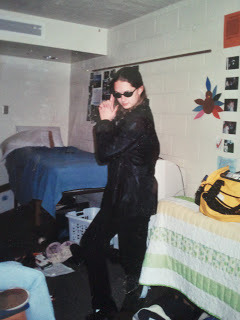
Me having fun, freshman year of college
When it comes to spies, though, keeping secrets is the honorable thing. They pledge their lives to keeping secrets—and with these secrets, lives can hang in the balance.
Sometimes spies must even keep secrets from those they love—even big secrets. Like many aspects of the spy life, this is a lot more popular in fiction than in reality. It does, however, happen. From what I hear, the official rule in the CIA's Clandestine Service is you can tell your significant other about your job once you're engaged. A story at a CIA training facility goes like this:
While that story is probably fictitious, it carries at least an ounce of truth: Spies are expected to keep secrets, even from the people closest to them—and that's a good thing! For me, that's one of the most interesting aspects of the job, even more than the fictional glamour and mystique, and even more than the lives they save: it's the personal costs that can run so high.
What do you think? Do you read or watch spy fiction? Why?
About the Author

An award-winning author, Jordan McCollum can't resist a story where good defeats evil and true love conquers all. In her day job, she coerces people to do things they don’t want to, elicits information and generally manipulates the people she loves most—she's a mom. Jordan holds a degree in American Studies and Linguistics from Brigham Young University. When she catches a spare minute, her hobbies include reading, knitting and music. She lives with her husband and four children in Utah.
Visit Jordan: BLOG & WEBSITE | FACEBOOK | TWITTER | GOODREADS
Jordan's first novel, I, Spy, is out now: Canada's the last place you’d expect an American spy. But even idyllic Ottawa has deadly secrets—and so does CIA operative Talia Reynolds. There's only one thing she can't do: tell her boyfriend Danny about her Top Secret occupation. When her latest target turns around and targets Danny, her schedule isn't the only thing suffering. To save her secrets and her country, Talia must sacrifice the man she loves. More about I, Spy | Amazon Kobo | direct from JordanMcCollum.com.
 by Jordan McCollum
by Jordan McCollumMaybe it's just a guilty pleasure. Maybe it's an obsession. Maybe it's simple wish-fulfillment fantasy. But with the popularity of everything from James Bond to Burn Notice, it's tough to deny the appeal of spies in fiction.
The glamour and the gadgets (and the girls!) are only the beginning of the coolness, however. Sure, spies get the coolest tools on television, but unsurprisingly the reality is a lot less glamorous and entertaining.
But it's not just the veneer of fiction that keeps us reading and watching spy stories, and I highly doubt much of the audience is interested in the politics and intrigue of made-up people. (We're scarcely interested in real politics & intrigue these days!)
So why is spy fiction so perennially popular? I think it traces back to the simple facts of the job itself. In real life, most spies don't directly save lives, catch bad guys, and engage in gunplay. Their real lives are much more quiet and covert, and largely involve trying to get other people who already have access to share or steal secrets.
Secrets. Even in real life, spies trade in secrets every day. And that's a big part, I think, of the subconscious appeal of the spy. Most people have a negative connotation with keeping secrets. We might keep confidences, but keeping secrets, it seems, is when other people don't tell us something we almost have a right to know, something important.

Me having fun, freshman year of college
When it comes to spies, though, keeping secrets is the honorable thing. They pledge their lives to keeping secrets—and with these secrets, lives can hang in the balance.
Sometimes spies must even keep secrets from those they love—even big secrets. Like many aspects of the spy life, this is a lot more popular in fiction than in reality. It does, however, happen. From what I hear, the official rule in the CIA's Clandestine Service is you can tell your significant other about your job once you're engaged. A story at a CIA training facility goes like this:
After months of training in DC, and several months of more in-depth instruction far away from family and friends, CIA trainees are allowed to bring their closest family members for a family weekend. As part of the weekend, family members are loaded onto a bus for a tour of the Farm facility.
One year, the instructor-turned-tour guide clapped his hands and welcomed the family members to the CIA.
One woman leapt to her feet. (In some stories, she's even holding a young child.) "The CIA?" she exclaimed. "My husband works for the CIA?!"
While that story is probably fictitious, it carries at least an ounce of truth: Spies are expected to keep secrets, even from the people closest to them—and that's a good thing! For me, that's one of the most interesting aspects of the job, even more than the fictional glamour and mystique, and even more than the lives they save: it's the personal costs that can run so high.
What do you think? Do you read or watch spy fiction? Why?
About the Author

An award-winning author, Jordan McCollum can't resist a story where good defeats evil and true love conquers all. In her day job, she coerces people to do things they don’t want to, elicits information and generally manipulates the people she loves most—she's a mom. Jordan holds a degree in American Studies and Linguistics from Brigham Young University. When she catches a spare minute, her hobbies include reading, knitting and music. She lives with her husband and four children in Utah.
Visit Jordan: BLOG & WEBSITE | FACEBOOK | TWITTER | GOODREADS
Jordan's first novel, I, Spy, is out now: Canada's the last place you’d expect an American spy. But even idyllic Ottawa has deadly secrets—and so does CIA operative Talia Reynolds. There's only one thing she can't do: tell her boyfriend Danny about her Top Secret occupation. When her latest target turns around and targets Danny, her schedule isn't the only thing suffering. To save her secrets and her country, Talia must sacrifice the man she loves. More about I, Spy | Amazon Kobo | direct from JordanMcCollum.com.
Published on July 04, 2013 21:01
July 3, 2013
Cause-Related Marketing
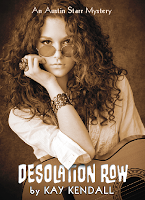
by Kay Kendall, @Kaylee_Kendall
Everyone knows the publishing world is in
upheaval and it’s a dog-eat-dog world as far as promoting books is concerned.
At first the various ways to connect through social media seemed to be
heaven-sent, yet now, after only a year or two, folks on authors’ chat groups
across the Web lament that book sales are flagging. They say that the kinds of
promotions that used to work are not as effective anymore.
What’s an author to do?
My
own debut mystery DESOLATION ROW was published by Stairway Press of Seattle
just this spring, and of course I have been going full-tilt with online
marketing. Lately I’m turning the bulk of my attention back to mystery number
two, but when I write for days on end and let the promotion slide, my sales
figures fall. So, like a yoyo, I pop right back to do more online marketing.
You know the drill. Facebook, Twitter,
Goodreads, blogging and/or guest blogging. And now, as if all us authors didn’t
have our hands full already, Everyone
says that an author has to add Google+
What is a poor besieged author to do?
In an earlier incarnation in life I was a
vice president of public affairs with American Express. This was in the late
eighties when the company was pioneering the concept called cause-related
marketing. Now I have begun my own version of that, and I suggest that you at
least consider it. It isn’t something you will have to do daily. The concept is
no longer brand new in the world of marketing, but it is not yet old hat in the
book world.
Simply put, you as an author know what
charitable causes have resonance with you. Find one that also relates to
something in your book. Then promote the fact that you will donate a part of
your royalties to that worthy cause. Both sides of the equation win. Even if
this does not sell more of your books today, you show your true colors as a
caring person about something that is not frivolous, something that is near and
dear to your heart. The homeless, arts in your community, a hospital funding
drive. The list is truly endless.
For example, DESOLATION ROW is set
against the backdrop of the Vietnam War. In 1968 a young bride from Texas uses
her CIA-honed skills to catch the real killer when her husband lands in a
Canadian jail for murdering the draft-resisting son of a United States senator.
Read the whole book and you will find that the overall thrust is pro-soldier
and anti-war.
Because of that ethos, and because I have
supported the organization for more than 30 years, I am choosing to donate a
portion of my royalties to the Paralyzed Veterans of America. When I talk about that, I not only share with
readers where my heart lies but also profile a worthy organization that does
essential work. Remember: the connection
between your writing and your cause is key.
I urge you to look at your writing and
your own causes. See what will work to make both sides of that equation gain
prominence and profile. A position that is win-win for all concerned is always
best. And as we used to say back in the day—slightly amended to what I am doing
now…WRITE ON!
=============
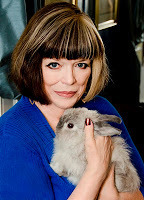
Kay Kendall is an international award-winning public relations executive
who lives in Texas with her husband, five house rabbits, and spaniel Wills. A
fan of historical mysteries, she set her debut mystery during the Vietnam War,
a key conflict of last century not already overrun with novels. Kay says her
mysteries feature women caught in their own battles during that unusual war
era. "In Desolation
Row I explore what life was like for a
typical young woman--not a headline maker, not a Hanoi Jane or Angela Davis,
but a moderate who nonetheless got swept up by history's tides during the
turbulent sixties. All that turmoil lends itself to drama, intrigue, and
murder." Kendall's now working on her second Austin Starr mystery, Rainy Day Women.
Published on July 03, 2013 04:07
June 30, 2013
Editorial Letters and Other Edit Requests:
By Elizabeth S. Craig, @elizabethscraig
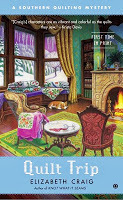
Not every editor sends editorial letters
along with requests for edits, but my editor for the quilting mysteries
does—and I love them.
The reason she’s
one of my favorites to work with in this business is because of the way she
approaches criticism. She opens her
letters full of praise for the story, and then brings up issues to be
addressed. It’s a pleasure to work with
her. I just received one from my editor
last week, and I’ll share some of the points she brought up in mine.
Things she mentioned that she liked in
the story (in case you’re editing your own mystery): plot twists, character
growth for minor characters (I tried hard in this particular story to show
different sides of characters…especially the more unlikeable ones), and the
setting. Y’all know I really don’t enjoy
setting (at all!) but this time I tried
to make the setting more fun to write so that I’d do a better job with it…I
released my inner Nancy Drew and wrote in secret passageways, trap doors, and a
spooky attic. I also brought in some
Southern Gothic elements…just because I’m a fan. The Gothic elements also made the setting
more fun to write in.
Wondering what types of issues come up in
editorial letters? I’m happy to share my
mistakes in case any of you have got the same sorts of issues. Mine seem to come up in the same categories:
Making
sure bits of story set-up are present at story wrap-up:
This book is an old-fashioned country
house mystery—remote location, ice storm, murderer in the house. You know.
So my set-up involved trees that had broken during the ice storm and
blocked the driveway, making escape down the mountainous driveway
impossible. Somehow, I’d forgotten to
mention those trees at the end of the story and during the rescue, there was no
mention of them. I quickly wrote in the
trees and the necessity of a chainsaw.
Make sure
that other mentions in the story are explained in the wrap-up:
Was there really a ghost?
How did a gun get into a character’s
room?
Why wasn’t the house heated?
Character
consistency:
I’ve got a character who was a wealthy
and ruthless businesswoman. Why would
her house be in such poor repair/so shabby?
Well, she was a miser and didn’t want to pay for the upkeep. In my head,
I knew this…forgot to share it with the reader.
And the
bits that were mentioned in Track Changes on the actual manuscript:
More
detail wanted (what did the van look like, sound like? What type of gun
was the gun?)
Transitions
needed: Needed a bit of text to show a car going into a driveway instead
of suddenly ending up at the house. Needed to add transition to a very abrupt change after a section break.
Correcting
what characters knew: How did the
characters know which bedroom was theirs?
Who is
speaking? A bit of dialogue
confusion.
Continuity:
Peanut butter sandwiches miraculously turned into pasta
Tension: Drawing out tension in one scene—I was asked
to add a few sentences between the appearance of a pale-faced, frightened
character and her explanation of what she’d seen to make her that way.
Echoes:
A couple of accidentally repeated words that meant I needed to rewrite one or
two of the words.
Convoluted
logic: A character made an assumption while creating a plan…a leap of
logic that didn’t really make sense. It
was simply a leap I needed the character to make. I wrote in other options and explained why
the character ended up making the plan she did.
A sentence
that was a little too rough for the genre: I toned it down for my cozy
readers, at the editor’s request. I must
have been in a grim mood that day! Read a bit more like noir than cozy.
So those were my edits for the book
coming out in December. Not too bad…able
to work methodically through them and make the changes in a day.
What kinds of things do you focus on
during your edits? Do you usually need to make similar changes to mine?
Published on June 30, 2013 21:01



